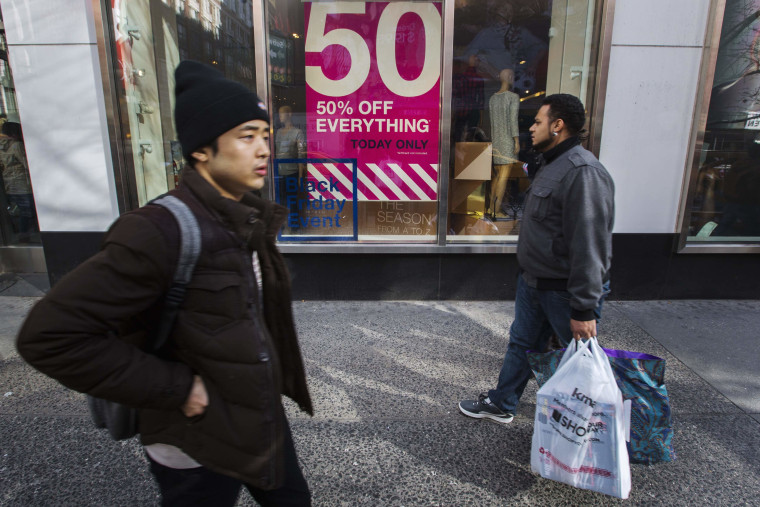
Patience is a virtue, especially when it comes to holiday shopping.
The retail industry is still crunching the numbers on how the kickoff weekend fared, a task made more complicated this year by the spillover of Black Friday into Thanksgiving and the growth of online and mobile shopping. The early read seems clear, though: While stores were open for more hours than ever, wallets stayed closed for all but the biggest doorbuster deals as consumers buffeted by poor economic trends remained wary of spending.
A total of 141 million shoppers — 2 million more than last year — hit the stores over the weekend, according to the National Retail Federation. These millions did more browsing than buying, though: Shoppers spent an average of $407.02 over the four-day weekend for an estimated total of $57.4 billion, down roughly 3 percent from last year.
Weekend shoppers snapped up the biggest deals, especially on hot items like iPads, but those doorbusters didn’t lead to a bigger spending surge. After weaker-than-expected back-to-school sales left retailers with unexpectedly high inventory, consumers and stores are engaging in what has become an annual game of chicken, with shoppers refusing to budge until prices drop even further.
There’s still the chance that a strong Cyber Monday could help offset some of the weekend’s weakness: comScore said shoppers at desktop computers bought $1.2 billion worth of stuff on Black Friday, making it the first billion-dollar day for the season, and Thanksgiving’s $766 million in sales were a 21 percent increase over last year. As of 3 p.m. Monday, the IBM Digital Analytics Benchmark reported Cyber Monday sales were up nearly 19 percent over last year, with mobile devices making up close to 16.5 percent of sales.
But even the appeal and convenience of shopping on their own time and avoiding the crowds isn’t likely to break the stalemate between merchants and customers. Shoppers are increasingly hard to impress.
“Prices were better over Veterans Day sales I noticed,” Facebook user Uzma Shah-Chishti wrote on the TODAY Money page.
As a result, analysts say it is likely retailers will blink, which means window-shoppers who left the mall empty-handed over the weekend might find that patience pays off. As the month progresses, shoppers can expect lower prices on everything from headphones to kids’ clothes to Android tablets.
“This is just the beginning,” said Alison Jatlow Levy, a retail strategist at consulting firm Kurt Salmon. She expects promotions to increase in number and get deeper. The takeaway for consumers: “Don’t buy anything at full price … because better deals are going to come,” she said.
R.J. Hottovy, a senior retail analyst at Morningstar, said a lot of the shopping reluctance is related to the broader economy.
Aside from the ongoing effect of the payroll tax cut expiration on Americans’ household budgets, “A lot of the new job growth we’ve seen is in more temporary or lower wage jobs [and] people are concerned about potentially rising healthcare costs,” Hottovy said.
Facebook user Marlene Dixon-Swann wrote, “I'm waiting (to shop) because I just don't have the money yet.”
These factors have made consumers hesitant, said Lisbeth McNabb, CEO of online marketing company DigiWorks. “We’re definitely going to see deals getting sweetened” as December progresses, she said. “They’re going to keep doing deals [because] customers are responding to them and customers are waiting for them.” Shoppers should especially look for promotions on electronics and toys, she said.
“A big part of it is consumers have kind of been conditioned to wait… especially for technology,” said Ben Arnold, director of industry analysis at the NPD Group. “That’s a common concern I hear from the companies I talk to.”
Chrissy Iacovelli wrote on Facebook that she was “absolutely … disappointed” in the Black Friday weekend deals. “I heard that the best time to shop this year is two weeks before Christmas, and I may even wait til after Christmas to get the better deals!”
Indeed, consumers “said the deals on Thursday night were great but the deals on Friday were so-so,” said Britt Beemer, chairman and founder of America's Research Group.
The company’s newest research found that the number of shoppers who thought the early-bird doorbusters were better last year grew by a margin of 13 percentage points. Last year, roughly a quarter of consumers said they only shopped in two stores on Black Friday weekend; this year, that figure grew to nearly a third.
Beemer predicted that clothing, especially children’s clothing, will be discounted up to 60 percent and small home appliances could be marked down by up to 55 percent before the season is over, while Arnold said prices on 7-inch Android tablets, headphones and streaming speakers could fall by the end of the month.
“A promotional apparel showdown was expected and didn’t disappoint. We saw louder, deeper, and broader value messaging than last year,” Goldman Sachs retail analysts wrote in a research note published Monday.
In a race to capture consumers’ holiday spending first, promotions started much earlier in the fall. Now, discounts of 20 percent or even 30 percent off aren’t enough to get people to make a purchase. “It’s in response to a customer that has become so promotion savvy it’s really the only way to win their spend,” Levy said.
To some extent, retailers knew this was coming. “So far, the discounting has been well controlled,” Hottovy said. “Typically, we won’t really have a good feel if there’s going to be any hits to margin until later.”
Shoppers should wait it out for better prices, Levy suggested. “As that sense of urgency increases, that’s where the cuts will start to be more constant and deeper,” she said. “The world is going to be promoted two weeks … from now. If you don’t have a sense of urgency, let them build their sense of urgency.”